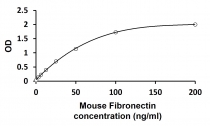ARG81186
Mouse Fibronectin ELISA Kit
Mouse Fibronectin ELISA Kit for ELISA and Mouse
Overview
| Product Description | ARG81186 Mouse Fibronectin ELISA Kit is an Enzyme Immunoassay kit for the quantification of Mouse Fibronectin in serum, plasma, cell culture supernatant and urine. |
|---|---|
| Tested Reactivity | Ms |
| Tested Application | ELISA |
| Target Name | Fibronectin |
| Conjugation | HRP |
| Conjugation Note | Substrate: TMB and read at 450 nm |
| Sensitivity | 1.3 ng/ml |
| Sample Type | Serum, plasma, cell culture supernatant and urine |
| Standard Range | 3.125 - 200 ng/ml |
| Sample Volume | 50 µl |
| Alternate Names | ED-B; CIG; GFND; Cold-insoluble globulin; FNZ; LETS; GFND2; Fibronectin; MSF; FINC; FN |
Application Instructions
| Assay Time | ~ 4 hours |
|---|
Properties
| Form | 96 well |
|---|---|
| Storage Instruction | Store the kit at 2-8°C. Keep microplate wells sealed in a dry bag with desiccants. Do not expose test reagents to heat, sun or strong light during storage and usage. Please refer to the product user manual for detail temperatures of the components. |
| Note | For laboratory research only, not for drug, diagnostic or other use. |
Bioinformation
| Database Links | |
|---|---|
| Gene Symbol | Fn1 |
| Gene Full Name | fibronectin 1 |
| Background | This gene encodes fibronectin, a glycoprotein present in a soluble dimeric form in plasma, and in a dimeric or multimeric form at the cell surface and in extracellular matrix. Fibronectin is involved in cell adhesion and migration processes including embryogenesis, wound healing, blood coagulation, host defense, and metastasis. The gene has three regions subject to alternative splicing, with the potential to produce 20 different transcript variants. However, the full-length nature of some variants has not been determined. [provided by RefSeq, Jul 2008] |
| Function | Fibronectins bind cell surfaces and various compounds including collagen, fibrin, heparin, DNA, and actin. Fibronectins are involved in cell adhesion, cell motility, opsonization, wound healing, and maintenance of cell shape. Involved in osteoblast compaction through the fibronectin fibrillogenesis cell-mediated matrix assembly process, essential for osteoblast mineralization. Participates in the regulation of type I collagen deposition by osteoblasts. Anastellin binds fibronectin and induces fibril formation. This fibronectin polymer, named superfibronectin, exhibits enhanced adhesive properties. Both anastellin and superfibronectin inhibit tumor growth, angiogenesis and metastasis. Anastellin activates p38 MAPK and inhibits lysophospholipid signaling. [UniProt] |
| Highlight | Related products: Fibronectin antibodies; Fibronectin ELISA Kits; Fibronectin Duos / Panels; Related news: New antibody panels for Myofibroblasts and CAFs New ELISA data calculation tool: Simplify the ELISA analysis by GainData |
| PTM | Sulfated. It is not known whether both or only one of Thr-2064 and Thr-2065 are/is glycosylated. Forms covalent cross-links mediated by a transglutaminase, such as F13A or TGM2, between a glutamine and the epsilon-amino group of a lysine residue, forming homopolymers and heteropolymers (e.g. fibrinogen-fibronectin, collagen-fibronectin heteropolymers). Phosphorylated by FAM20C in the extracellular medium. Proteolytic processing produces the C-terminal NC1 peptide, anastellin. Some lysine residues are oxidized to allysine by LOXL3, promoting fibronectin activation and matrix formation. |
Images (1) Click the Picture to Zoom In
| Title | Download Link |
|---|---|
| ARG81186 Mouse Fibronectin ELISA kit User manual |
 Download Download
|






